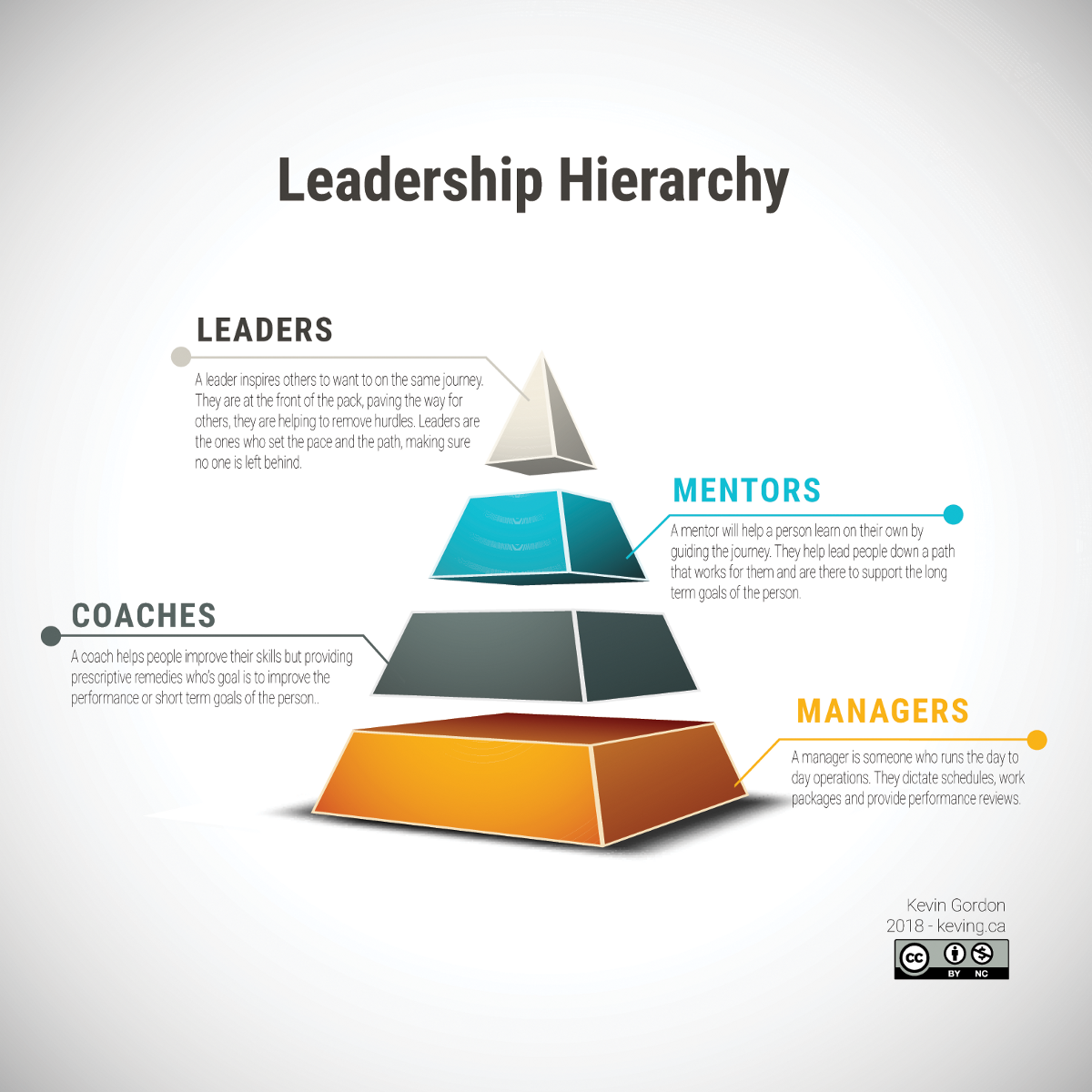Often the words Leader, Manager, Coach and Mentor are used interchangeably to describe a person in a position of power, who oversees the activities of others and has the power to make decisions on behalf of others.
In reality, the four are part of the Hierarchy of Leadership. Like any Hierarchy, there are more people at the bottom than the top, for a good reason. Typically there are fewer people capable of being a leader than there are those capable of being a manager.

Let’s break down the differences between the four into more detail, starting with where most people fall in to, the management tier.
Foundation of the hierarchy: Managers
Management is the foundation of the leadership hierarchy and with good reason. To be a good leader, you need to be a great manager. In many cases, a manager is someone who manages the day to day operations of their staff. They can dictate schedules, work packages, initiate corrective action plans, hire and fire staff and similar daily activities.
Most managers do not set the course for their team, they implement the vision from those above them, both in the corporate and leadership hierarchy. From my experience being in the workforce for 20 years and being on numerous boards, committees and other organisations, managers do not provide professional development for their teams, they maintain the status quo, and use phrases like Employees are replaceable.
Sadly, I’ve heard this all too often in the past. Most managers do not understand the value of institutional knowledge, the loyalty of a good employee and forget about the cost of training a replacement. While putting another ass in the seat is more than doable in most cases, replacing the person in the role is impossible.
Leading based on experience: Coaches
The next level up we have coaches. Sports analogies are great to explain coaching. Let’s look at golf. A golf coach wants you to make quick wins, so they may instruct you to adjust your stance, rotate the club face a bit, change your pivot or adjust how you hold the club. The coach is sharing their best practices, their knowledge of the sport with you to make you a better player. They provide prescriptive remedies to a problem.
Coaches lead based on their own experiences. They have been there, done that and have enough experience to know what works, what doesn’t and how to correct common problems.
In the business world, we need coaches. We need people who can assess a situation quickly and identify a remedy to keep the ball moving down the field without impacting the day to day business operations.
However, coaches can fall short too. What are you learning from your coach is how to obtain a result without any of the background that goes into the knowledge. For many, the background is their secret sauce, why they feel they can add value to a situation or they just do not know how to explain how they know what they know.
Think of when you are coaching your child’s sports team. You don’t take time to explain why you want them do things differently, you just show them how and tell them to do it.
In for the long haul: Mentors
Second from the top, we have mentors. Mentors are in it for the long-haul. They want to see their people grow, they don’t just tell people what to do or provide advice, but help lead people down a path that works for them. A mentor works with you to understand your goals and ambitions, your motivators and detractors and helps build a plan that works for you, based on your unique needs.
Using our golf analogy, if a golfer keeps swinging the club the same way over and over but is upset with their performance, a coach will tell them how to fix it. A mentor will suggest they try something different, like “What happens to your shot if you rotate the club face?” A mentor will help a person learn on their own by guiding the journey.
In business, this equates to a professional development plan. By working with the team member to identify their short term and long-term career goals, whether with you as their current employer, or with another company.
Listen, it sucks when good people want to leave, but we have a stewardship responsibility to our people to grow them to the best of our abilities while they are with us. I’d rather have someone leave and speak highly of our company because of all the great things we did for them than not. Employees, like customers, will either rave about you or rant about you. It’s your choice really.
A professional development plan doesn’t need to be complicated, and it doesn’t need to involve a financial investment from the company, just a willingness to train internally, cross train, or be mentored by another subject matter expert in the area the person wants to be trained in.
Inspiration at the top of the hierarchy: Leaders
At the top of the hierarchy is a leader. Where there is a leader, there must be someone who wants to be lead. A leader has the qualities of a mentor, a coach and a manager and knows when they need to use their skills in each of these areas to move the agenda forward.
A leader inspires others to want to be on the same journey. They have vision of the future and an idea of how to get there. They are at the front of the pack laying out the end goal, creating paths for others to follow and they help remove hurdles that could be in the way. Leaders are the ones who set the pace and the path, making sure no one is left behind.
People who follow leaders do so willingly, whereas people who report to managers do what they are told. Notice the language difference, follow versus report?
A leader needs a clear and obtainable goal. They need to be able to explain why a journey must be undertaken, what the net benefit will be and help the team identify what work needs to be done to reach the goal.
A leader needs to have all the skills of a mentor, a coach and a manager and most importantly, know when to use them, but always starting with lead.
Being a leader can be difficult. You need to educate, entertain and inspire others all at the same time while maintaining composure, being respectful and keeping the values of others in the front of their mind.
As leaders, we need to take each person on their own journey to the finish line. Everyone has their own definition of winning, they follow for different and usually selfish reasons. How we communicate the goal to different people must be fluid.
Reflecting on the hierarchy of leadership
I encourage you to think about your position in the leadership hierarchy and reflect on your own style. Ask yourself these six questions about your professional and personal life
- Where do you feel you are most often on the hierarchy?
- When was the last time you were a leader?
- When was the last time you mentored someone?
- When was the last time you coached someone?
- When was the last time you were a manager?
- Where do you feel most comfortable on this hierarchy?
You may surprise yourself and realize you do all of these things at various times. For example,
- You may be a leader when you convince your significant other to go on a specific vacation, renovate the home, or buy a new car. You had a vision, and unless you forced them into it with strong-arm tactics, you probably painted them a picture of why and they bought in.
- You may have mentored a friend by helping them through a tough situation, by providing guidance and support by asking probing questions, listening to their answers and providing recommendations based on their needs.
- You might be a coach of your child’s sports team and helped a player hit a home run or score a goal through sound advice based on your previous experience with the sport.
- You probably manage people daily, whether giving chores to a child or work packages or assignments to employees.
It is okay if you aren’t comfortable being a leader, not everyone is. By understanding your skills and strengths, you can focus your energy to develop in that area to be the best version of you that you can, and isn’t that the point?
I’d love to hear what your thoughts are on the leadership hierarchy. Leave your comments below!
Powered by Froala Editor


